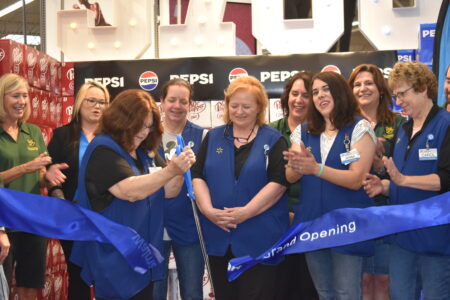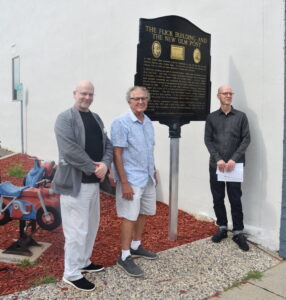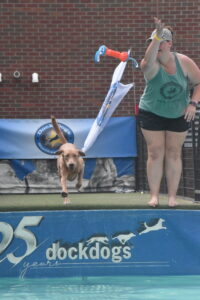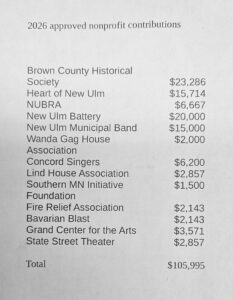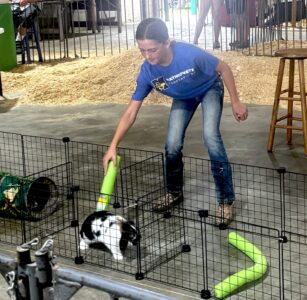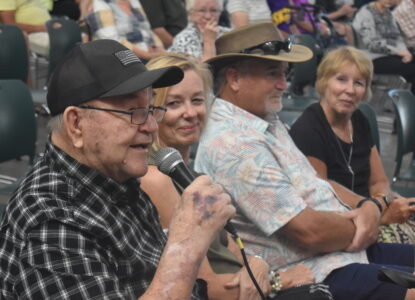‘Still several unknowns’
Dahms, Torkelson hold town hall ahead of 2024 Legislative session
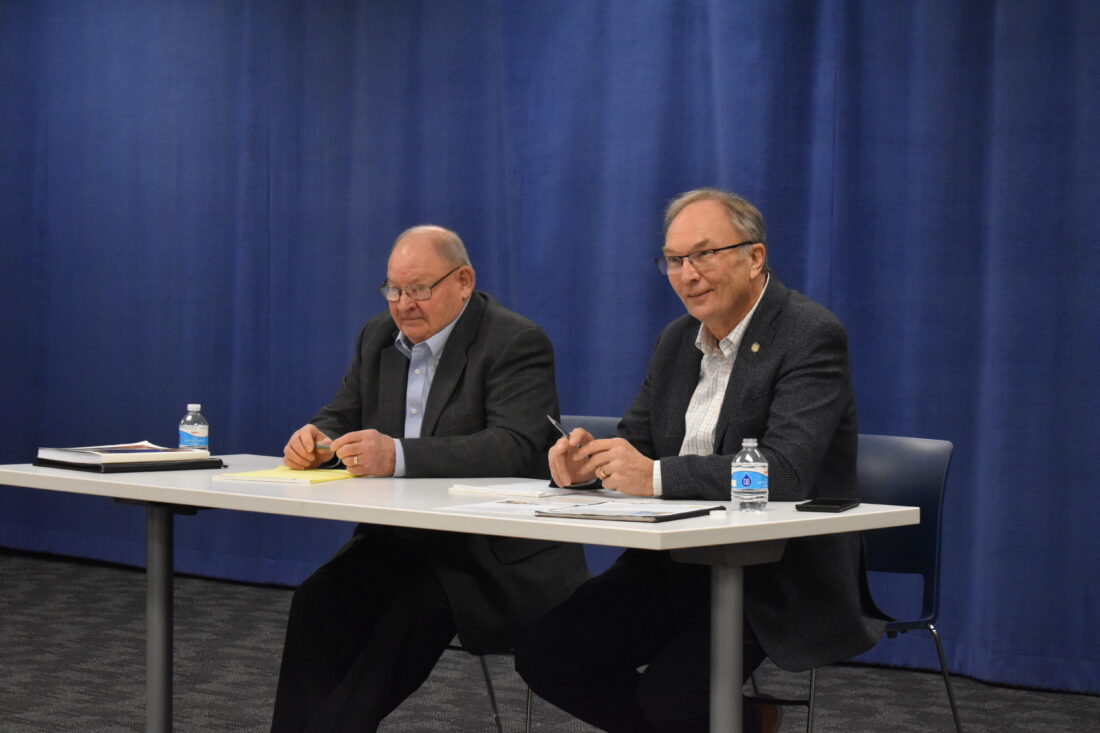
L to R: State Sen. Gary Dahms (R-Redwood Falls) and State Rep. Paul Torkelson (R-Hanska) held a town hall meeting at the New Ulm Public Library ahead of the 2024 legislative session.
NEW ULM — DFL spending, nursing home funding, and clearing up cannabis laws were the main talking points of Wednesday’s town hall State Sen. Gary Dahms (R-Redwood Falls) and State Rep. Paul Torkelson (R-Hanska) held at the New Ulm Public Library.
The town hall meeting was intended to provide information to constituents ahead of Minnesota’s 2024 legislative session.
Dahms opened the meeting with a budget summary of last year. He said ahead of the 2023 session, Minnesota had a budget surplus of over $17.5 billion, which he had hoped would be used to reduce taxes, but instead was spent by the DFL who controlled the majority in the House, Senate and Governor’s office.
He said at the end of the last biennium, the state budget was $51 billion but has now increased to over $70 billion.
“That’s not sustainable,” Dahms said. “We can’t keep spending that kind of money.
The forecast for the next year is a surplus of $2.4 billion, but going into the next biennium the state is looking at a $2.3 billion deficit.
“Hopefully we can take the $2.4 billion surplus from this year and roll that into the next bi-annual budget,” Dahm said. If everything remains static, the state could still have an $81 million surplus. However, there are still several unknowns going into the next session.
Early in the town hall, Torkelson reminded everyone he and Dahms were in the minority. He said the DFL would continue to control the House, Senate and Governor’s office for at least the next year.
Torkelson said 2024 was the second year of a biennium, it will likely be a shorter session. He believed the focus in 2024 would be on the bonding and capital investment bills. A capital investment bill was passed last session because the state failed to pass a bonding bill in 2022.
Torkelson said he heard rumblings that in the House, DFL leadership wanted to do a bonding bill and nothing else, but said the DFL caucus could have other goals for the session.
Dahms and Torkelson indicated a top issue for them in the next session was assisting rural nursing homes. Rural nursing homes continue to struggle with staffing shortages and funding. Some rural care facilities have been forced to close.
Torkelson said the issues with nursing homes extend to hospitals. Patients who would normally be discharged from a hospital to a nursing home for extended care are remaining at the hospital. The lack of staffing means rural nursing homes cannot take on new patients. Without extra bed space, the patient remains at the hospital creating a backup in the hospital system.
Dahms said there were efforts to help nursing homes last session, but were unable to negotiate for more funding until the end.
“We were able to negotiate $332 million in additional spending for nursing homes,” Dahms said. “A good share of that went to rural nursing homes.”
The nursing homes were given lump sum payments to help stabilize them. Dahms said this helped, but there are still issues with funding nursing homes. He is hopeful legislators will take long-term solutions to funding.
“Two years ago we looked at the nursing home problem; it looked like a $ 1 billion project to resolve it,” Dahms said. Since then around $600 million were put into the project. He estimates about $400 million is still needed.
Another issue with funding for rural nursing homes is the delay in funding. The state is required to reimburse nursing homes for their Medicaid expenses after reviewing the nursing homes’ annual cost reports. It takes the state Department of Human Services 18 to 24 months to review rural nursing home reports, while metropolitan facilities’ reports are usually completed within a year. This means rural nursing homes like Oak Hills are still being reimbursed for their cost report from 2021 as expenses continue to rise.
Constituents asked if this delay in reimbursement could be fixed on the state level.
Torkelson believed the state should fix the delayed payment to rural nursing homes, but was unsure if it could move forward if the DFL continued to stonewall efforts.
Minnesota’s free school lunch for all program was a contentious issue at the town hall. There was concern that the new law could have an unintended negative effect on school funding.
Previously, Minnesota would use a school’s free and reduced lunch program list to determine how much aid a school received. Last session, Minnesota approved a free school lunch program for all. As a result, families no longer need to apply for free or reduced lunches.
Dahms and Torkelson were asked if there was another way to determine how much aid a school needed. Both legislators had opposed the free school lunch program. Dahms said in his opinion the real purpose of the program was to get rid of this funding formula and remove money from rural schools.
“I think it is going to hurt rural Minnesota,” Dahms said. “In my opinion, the purpose of the program was to change the formula.”
Dahms said the state will need a different formula for determining school funding, but currently, there is no new method.
“We should be spending our money wisely helping the people who need help,” he said. “Giving a free lunch to people who can afford to buy a lunch is not a wise use of our resources.”
Torkelson felt the lunch program was unnecessary and as a consequence eliminated a necessary tool for determining who needed aid.
Overall, Dahms and Torkelson believed a lot of laws pushed through by the DFL went unchecked and would need to be repaired in the next session.
Torkelson cited marijuana legalization as an area that needed to be cleaned up. Currently, two of the top administrative positions for the state’s cannabis program are vacant.
“This huge undefined program for marijuana is lacking leadership and lacking clear definition on who can do what,” Torkelson said. “These products are potent and will have an effect on our society….there is work to be done.”
At the close of the town hall, Torkelson encouraged everyone who was eligible to vote to do so.
“These last few years there has been some suspicions raised about our voting system,” he said. “I don’t think they are appropriate. I think our system works pretty well…Minnesota does a pretty good job on voting participation but there is always room for improvements.”
Minnesota’s 2024 legislative session begins Monday, Feb. 12.
The entire town hall hearing will be broadcast on New Ulm Community Access Television.

